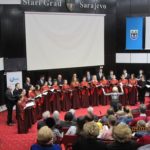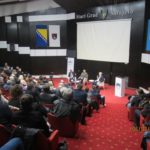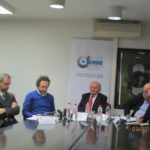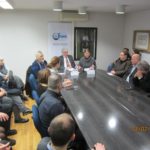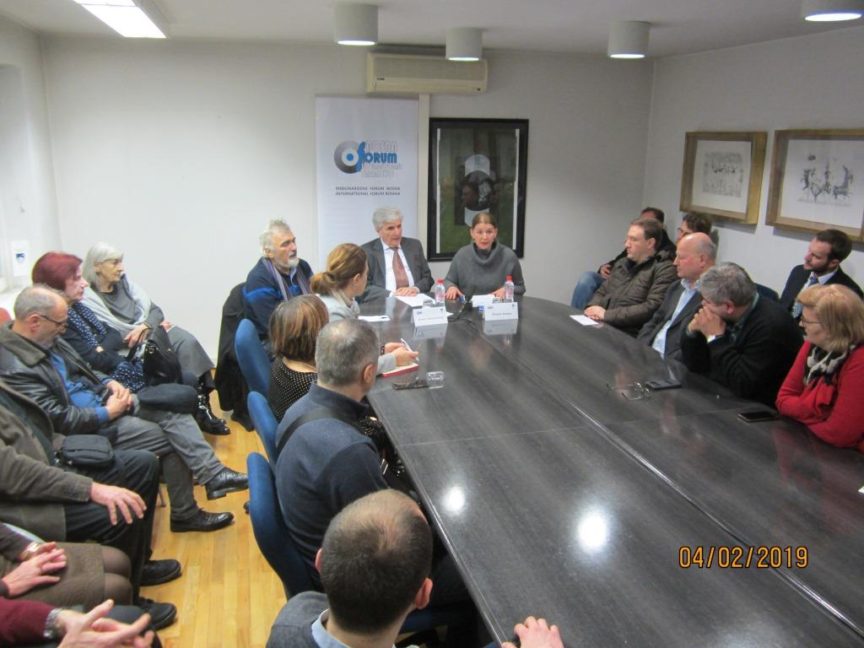
THE SEVENTH SARAJEVO UN WORLD INTERFAITH HARMONY WEEK
Report on THE SEVENTH SARAJEVO UN WORLD INTERFAITH HARMONY WEEK Sarajevo, February 4th to 9th, 2019
International Forum Bosnia’s Centre for Interfaith Dialogue is pleased to report the completion of its programme to mark the Seventh Sarajevo UN World Interfaith Harmony Week in February 2019. Continuing its tradition of holding the Sarajevo UN World Interfaith Harmony Week since its inception in 2013, and particularly after the success of the activities for 2017, which won Second Place in the King Abdullah II of Jordan Prize for that year, the organisers and participants decided to prepare a programme for 2019, again under the patronage of Sarajevo Old Town Municipality.
The programme opened on February 4th with a public lecture by Prof. Rusmir Mahmut?ehaji? on The Philosophy of Religion and Social Pluralism in Bosnia. This was followed the next evening by a public discussion entitled An anthropological perspective on Bosnia, Safet Hadžimuhamedovi?’s new book Waiting for Elijah: Time and Encounter in a Bosnian Landscape. On February 6th, there was a public conversation between Rusmir Mahmut?ehaji? and the Major of Sarajevo Old Town municipality, Ibrahim Hadžibajri?, on The Future of Sarajevo.
On Thursday, February 7th, there was a public discussion on The Future of Interfaith dialogue: Muslim-Christian Encounters through A Common Word, eds. Yazid Said and Lejla Demiri, followed on Friday, February 8th, by a public discussion on Discovering the beauty of Bosnian literature through Lejla Nakaš’s new book Paratextuality in mediaeval Bosnian literature. The week was closed with a concert of Musica Sacra Bosnae: An Evening with the Pontanima Choir on February 9th.
The first event was a lecture on The Philosophy of Religion and Social Pluralism in Bosnia by Prof. Rusmir Mahmut?ehaji?. It was held at the IFB meeting room (ul. Sime Milutinovi?a 10/III) at 18:00 hours, on Monday, February 4th, 2019.
Professor Mahmut?ehaji? is one of the leading experts in Europe on the religious phenomenology of the Muslim intellectual tradition, philosophy of religion and its interface with the philosophy of science, and the dialectic of unity and plurality in open, multifaith societies. His academic works have been published in English by Brill, Oxford, Cambridge, Fordham, SUNY, World Wisdom, and the CEU Press, amongst others, as well as in Bosnian, Italian, French, German, Turkish, Indonesian and other languages.
In his lecture, Prof. Mahmut?ehaji? addressed the 20th century subordination of religion and religious institutions to the ideological needs of ruling elites in Bosnia and the Balkans and the subsequent reduction of religious plurality to simplistic caricature. He argued that any revival of public and intellectual life in these countries had to reverse the exclusion of religion from the public sphere and academic life, without allowing a reactionary subjection of intellectual and political thought and freedom to ideologised religion. The reconstruction of public life can only be achieved along with the recognition of the role of a critically grounded dialectic of faith and liberty as forms for the expression of human dignity and the development of human character.
Prof. Mahmut?ehaji? ended his talk with an appeal for the introduction of university-level studies of the philosophy of religion and of comparative religion in Bosnia as a first step towards ensuring a critical but enabling environment for the development of a free and enriching discourse on the role of religion and the religious traditions in social and individual life and so as a valid source of values for the creative renewal of forms of political life that transcend mere personal interest. The lecture was followed by a lively discussion amongst those present, who included some of the leading members of Bosnian intellectual and academic life. The lecture and the discussion were recorded for transmission on public radio at a later date.
The event the following day, February 5th, was a public presentation and discussion of Safet HadžiMuhamedovi?’s new book Waiting for Elijah: Time and Encounter in a Bosnian Landscape (New York: Berghahn, 2018). The discussion took place at the IFB meeting hall (ul. Sime Milutinovi?a 10/III) at 18:00 hours.
Safet HadžiMuhamedovi? is a leading young social anthropologist from Sarajevo, who is now teaching at the University of Bristol and the SOAS of the University of London. He has done field work in Bosnia, the Lebanon, and a number of other places around the world. His new book Waiting for Elijah: Time and Encounter in a Bosnian Landscape is a study of a mixed rural community in Bosnia that was radically affected by the war of the 1990s. The traditional structures that brought together Serb Orthodox, Muslim, and Roma groups into a complex social whole were torn apart by war, with the Muslim and Roma groups subjected to mass violence and expulsion. Only a very few have returned and attempted to recreate the social patterns of the pre-war period. This has proved a difficult process.
Safet’s fieldwork was conducted with this group and their Serb Orthodox neighbours. It examines their past and new social realities through their current experiences and memories of the ritual and festival year and how it bound the disparate elements of their communities into a greater social whole. His study thus opens up new ways of approaching the plurality inherent to Bosnian society, a plurality that has long been subject to politically motivated and violent deconstruction. Key to this deconstruction is the stereotypical and ideological denial of any overarching Bosnian framework. Applying current anthropological approaches to the study of Bosnia’s social pluralism, Safet HadžiMuhamedovi? demonstrates clearly the subtle, but undeniable presence in interlocking levels of personal and collective identity of recognisably Bosnian patterns of social and cultural complementarity and cohesion. This forms a Bosnian whole that embraces all its parts.
In this way, his study makes visible aspects of Bosnian social and cultural interaction that often remain implicit and are therefore often ignored and denied by superficial or ideological motivated observers. At the heart of his approach and of his findings is the reality that Bosnian society is essentially interreligious and that none of the constituent groups is an independent or self-sufficient social reality. They rely on each other for their mutual self-constitution as part of a whole that is greater than and informs each of its individual parts. The book was presented by Nirha Efendi?, Curator at the National Museum in Sarajevo, Desmond Maurer, chair of the IFB Centre for historical studies, and Vahid Tanovi?, chair of the IFB Centre for technology and economic development, and moderated by Nerin Dizdar, a leading Bosnian social and political analyst and commentator. While the author was regrettably not able to be present, some of his key informants and interviewees were, and they also discussed the research process and what the book meant for them and their community.
This was followed on February 6th by a public conversation between Rusmir Mahmut?ehaji? and the Mayor of Sarajevo Old Town municipality, Ibrahim Hadžibajri?, on The Future of Sarajevo. The event was held at the Sarajevo Old Town Municipality Great Hall (ul. Zelenih beretki br. 4) at 18:00 hours.
In their conversation, Rusmir Mahmut?ehaji? and Ibrahim Hadžibajri? discussed the role of Sarajevo and its symbolic heart, Baš?aršija, in the political and cultural life of Bosnia and their potential contribution to the project of building a prosperous Bosnia for all her citizens.
The questions addressed included: What are the major and most urgent issues facing the recovery of Sarajevo as a city in which its citizens can build decent, healthy, and happy lives? How can we bring about the political, cultural, and economic synergies required to attain this goal? How can re-claiming Sarajevo’s present and future as capital city contribute to building a better functioning state in Bosnia and Herzegovina? Prof. Rasim Ga?anovi?, former mayor of the city of Sarajevo, chaired the discussion. The programme continued on February 7th with a public discussion on The Future of Interfaith dialogue: Muslim-Christian Encounters through A Common Word, eds. Yazid Said and Lejla Demiri, (Cambridge: Cambridge University Press, 2018), in the IFB meeting room (ul. Sime Milutinovi?a 10/III) at 18:00 hours. Muslim-Christian relations are crucial for the future of the world. They will only become even more important, as religious pluralism plays an increasing role in every sphere of life. The unacceptably poor state of relations between Muslims and Christians is often attributed to the sacred doctrines held by these complex global communities. In fact, the doctrinal core of their sacred traditions already contains the grounds for understanding religious pluralism as a gift from God. This was why, on October 13, 2007, 138 Muslim intellectuals addressed the world public, but particularly their Christian brothers, with A Common Word between You and Us. Their document sets forth the doctrinal basis for dialogue and for our shared responsibility for peace and order. It has led to an ongoing process of interfaith dialogue. The book that served as the occasion for this discussion includes essays on this process by 19 leading Muslim and Christian theologians, philosophers, and political scientists: Lejla Demiri, Tim Winter, Jonathan Kearney, Michael Louis Fitzgerald, Rowan Williams, Ingrid Mattson, Reuven Firestone, Sarah Snyder, Peter Admirand, Asma Afsaruddin, Daniel A. Madigan, Pim Valkenberg, Clare Amos, Rusmir Mahmut?ehaji?, Mustafa Abu Sway, Matthias Böhm, Amir Dastmalchian, Marianne Farina and Yazid Said. The panel discussing the book included leading Sarajevan intellectuals from each of the major religious traditions in the city, namely Prof. Samir Beglerovi?, Muslim philosopher and theologian, Jakob Finci, a renowned Jewish public intellectual and ecumenical activist, Prof. Ivo Markovi?, a Franciscan priest, philosopher, theologian and ecumenical activist, and Krsto Mijanovi?, a lay expert on Serbian Orthodox Christianity and a leading analyst of Bosnian religious pluralism.
Prof. Asim Zub?evi?, an expert in Muslim culture in Bosnia and Chair of the IFB Centre for Interfaith Dialogue, chaired the discussion, which was followed by a question and answer session with the public. Key issues raised included the need for a chair of comparative religious studies and a chair of Judaic studies at the University of Sarajevo to promote the cooperation at a formal level of the intellectual leaders of the religious traditions in Bosnia and so promote interfaith dialogue at the level where future religious leaders are trained, in the theological faculties and seminaries. The next event was a public discussion on Lejla Nakaš’ new book Paratextuality in mediaeval Bosnian literature (Sarajevo: Forum Bosnae, 2018).
The event took place at the International Forum Bosnia meeting room (ul. Sime Milutinovi?a 10/III) at 18:00 hours, on Friday, February 8th, 2019. This event continued our traditional focus during the World Interfaith Harmony Week on new publications related to Bosnia’s mediaeval heritage, in which the manuscripts of the mediaeval Bosnian Church play a central role. These manuscripts are scattered around the world. Their importance for the study of mediaeval Bosnian literature is matched only by their implications for the critical understanding of Bosnia’s mediaeval church and its alleged heretical or Manichaean character. As a result, discussion of Mediaeval Bosnia’s religious heritage has tended to focus on controversial issues in historiography and heresiology, rather than textual investigation of the manuscripts. As part of her project, under the auspices of IFB, to create a library of facsimiles and critical editions of that manuscript heritage, Prof. Lejla Nakaš here offers the first proper overview of how the heresiological interpretation of specific aspects of Bosnian Christianity (the Bosnian Church) is and should be related to textual research on the manuscripts themselves. This represents a major scholarly advance in this area of Bosnian cultural studies.
The speakers were Academician Mile Babi?, a Franciscan priest, philosopher and theologian, who addressed the theological aspects of Prof. Nakaš’ studies, Desmond Maurer, the chair of the IFB centre for historical studies, who looked at the relationship between paratextuality and the reconstruction of systems of ritual and belief and so their implications for understanding the historical nature of the Bosnian Church, Dr. Erma Rami?-Kuni?, an expert on mediaeval Bosnian literature who discussed the significance of Prof. Nakaš’ findings for her field, and Dr. Alen Kalajdžija, an expert in linguistics and Bosnia’s written heritage, who reviewed the importance of the findings for his field of expertise. Prof. Almir Bašovi?, an expert on Bosnian culture in world context, chaired the discussion. The final event of the week was a public concert by the Pontanima Choir in the Sarajevo Old Town Municipality Great Hall (ul. Zelenih beretki br. 4) at 19:00 hours on Saturday, February 9th , 2019. Pontanima is a world-renowned interfaith choir that has performed in front of popes, crowned monarchs and heads of state. Its repertoire of sacred music has been built up over many years and includes songs from the Catholic, Orthodox, Jewish, and Muslim traditions in Bosnia and Herzegovina. The choir has performed as part of the Sarajevo UN World Interfaith Harmony Week programme in several previous years.
The programme director was Ivo Markovi?, one of the founders of Pontanima.
Asim Zub?evi? IFB Centre for Interreligious Dialogue
Nermina Jusi? IFB Coordinator


